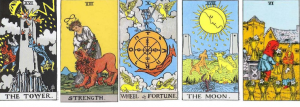I just received the final rejection letter from my last batch of queries.
It was my forty fourth.
So why don’t agents and publishers want it?
There are several possibilities:
The writing isn’t good enough. Since I’ve never published anything before or won any writing contests, this was a big concern for me. However, my editor, Jessica Morrell, says I’m as good as or better than most of the writers she works with (she works with several best selling authors) and that Forging the Blade (old title: The Remaking of Molly Adair) is a publishable book.
The pitch isn’t good enough. The pitch is a quick description of your book. It says, in a few short paragraphs, what the story is about, why someone would want to read it, and why you are the best person to tell the story. It is even more difficult to write than the book itself. I’ve taken several pitch classes and written and rewritten it at least fifty times, and each time it gets better. Perhaps it still needs more work.
I’m pitching to the wrong people. The obvious advice is “If you write young adult fantasy, send your queries to agents and publishers that do young adult fantasy.” I have done this. All forty-four of my rejections were from YA fantasy agents and publishers.
I haven’t found the right agent. This is a possibility, and I will continue to send out queries.
The concept isn’t salable. This, I think, is the problem. Looking back over my stash of rejection letters, many  agents say that they weren’t sold on the concept. Forging the Blade is the story of Molly Adair, a young woman who comes of age the hard way. Her parents die and her grandmother, a mage and her only living relative, sends her to Damia, a world where magic is strong and dragons not only exist, but also wreak havoc. The kingdom is at war and a rogue dragon is terrorizing the countryside. Her job is to get home. Her guides are a deck of tarot cards, a magical black cat, a mysterious gypsy, and a warrior mage. As she flees through Damia, one step ahead of Death, the dragon, and the king’s soldiers, Molly realizes that the true challenge has nothing to do with getting back to her grandmother’s house, it’s about figuring out who she really is and becoming that person. She must recreate herself, because the life she had is gone forever. Each chapter describes a major arcana tarot card, beginning with 0, The Fool and ending with 21, The World. It is a classic hero’s journey, well written and exciting, but YA fantasy agents and editors have read hundreds of classic hero’s journeys and are looking for something new. The thing that sets this book apart is the tarot angle. My tarot teachers have always said that the major arcana is the story arc of the hero’s journey; so I wrote a book that traces that story arc card by card, and it worked beautifully. But young adults (ages 13-18) aren’t interested in tarot; in fact many of them don’t even know what a tarot deck is.
agents say that they weren’t sold on the concept. Forging the Blade is the story of Molly Adair, a young woman who comes of age the hard way. Her parents die and her grandmother, a mage and her only living relative, sends her to Damia, a world where magic is strong and dragons not only exist, but also wreak havoc. The kingdom is at war and a rogue dragon is terrorizing the countryside. Her job is to get home. Her guides are a deck of tarot cards, a magical black cat, a mysterious gypsy, and a warrior mage. As she flees through Damia, one step ahead of Death, the dragon, and the king’s soldiers, Molly realizes that the true challenge has nothing to do with getting back to her grandmother’s house, it’s about figuring out who she really is and becoming that person. She must recreate herself, because the life she had is gone forever. Each chapter describes a major arcana tarot card, beginning with 0, The Fool and ending with 21, The World. It is a classic hero’s journey, well written and exciting, but YA fantasy agents and editors have read hundreds of classic hero’s journeys and are looking for something new. The thing that sets this book apart is the tarot angle. My tarot teachers have always said that the major arcana is the story arc of the hero’s journey; so I wrote a book that traces that story arc card by card, and it worked beautifully. But young adults (ages 13-18) aren’t interested in tarot; in fact many of them don’t even know what a tarot deck is.
I’ve written a sequel to Forging the Blade. It’s called Mainly by Moonlight and is set at Grant High School in Portland, Oregon. It’s a YA occult murder mystery, which is a much more salable concept. So I was hoping to sell the second book first and then publish Forging the Blade as a prequel. Sort of like George Lucas did in Star Wars. He waits to tell you about Darth Vader until after you find out he’s Luke’s father.
I’m reading Mainly by Moonlight to my writers group and asked them to determine if it could be a stand-alone book. In my humble opinion, every aspiring writer should belong to a writer’s group. We live with our work spinning around in our heads; it’s a part of us. When we read our words to a group of writers they come out of our heads and into the world and hang there, naked and shivering, as our colleagues pick them apart. This could be a brutal experience, but I’ve been lucky. The folks in my groups have been supportive and truly helpful. They have also been very exacting and on task about finding ways to make what I’ve written better.
The group said it’s not a stand-alone book. I have to publish Forging the Blade first.
Jessica gave me the names of a few agents who may be interested in it. She says I can use her name—a true gift. She suggested I downplay the tarot aspect and sell it as a timeless coming of age tale.
So, I’ll send out another round of query letters in hopes of finding “the right agent”, But I am also beginning to look seriously at self-publishing. It’s risky and expensive, but at least my book will be out where everyone who wants to read it can buy it.




6 thoughts on “Rethinking My Strategy”
Self-publishing is not an unreasonable way to go, Chrissie. I am excited about getting to read the series (even though I’m not in your YA audience). The problem is always how to do the promotion. My son-in-law has self-published an urban fantasy novel through Amazon and was a finalist in their “emerging authors” competition. It sells regularly, but self-publication requires a level of commitment to self-promotion that he finds difficult. But it has to be done, so he does it. As I suspect you will, as well. I’m rooting for you, Chrissy, and I’m really looking forward to reading the story!
Thank you for the encouragement. Right now I need all I can get.
What is that comment” Time to Pull up your Big Girl Panties and keep going”
I think your doing that gracefully and with style!!. Good to read Ron’s comments re Amazon self publishing. Molly has to get out to the world, and that may be the best way to slay the publishing Dragon, HA
Yes, but it costs money and it’s work. But, as Ron says, if I have to, I’ll do it.
I am not yet convinced that skipping from a traditional approach (agent and major publisher searches) to self-publishing is the immediate answer. You might take a look at the numerus small publishers like Second Wind and Vanilla Heart. This, I think gives you some publisher support as well as the validation of having gone through a publisher.
While small presses aren’t going to have the clout of the big publishers, I think it’s even more difficult for self-publishers to make any money (not counting those with huge platforms or those who first got their recognition with a large mainstream publisher).
Malcolm
I totally agree, which is why I’ve hesitated to self publish.
It seems that you are liking Vanilla Heart, and there are a few other publishers I will look at.
Right now, the manuscript is being read by an agent who requested it after one of her people in acquisitions, a friend of mine, read this blog and brought “Forging the Blade” to her attention. Keep your fingers crossed for me!